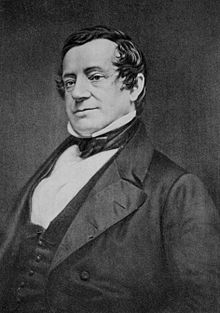Washington Irving was born on April 3rd, 1783,
the son of Orcadian William Irving. As
noted previously in this blog, Sir Walter Scott helped Irving publish his “The
Sketch Book of Geoffrey Crayon” in England. The
story is told in Samuel Smiles’ memoir of John Murray “A Publisher and his
Friends”.
‘…A business in
Liverpool, in which, with his brother, he [Irving] was a partner, proved a
failure, and in 1818 he was engaged on his famous "Sketch Book,"
which he wrote in England, and sent to his brother Ebenezer in New York to be
published there. The work appeared in three parts in the course of the
year 1819. Several of the articles were copied in English periodicals and
were read with great admiration. A writer in Blackwood
expressed
surprise that Mr. Irving had thought fit to publish his
"Sketch
Book" in America earlier than in Britain, and predicted a large
and eager
demand for such a work. On this encouragement, Irving, who was
still in
England, took the first three numbers, which had already
appeared in
America, to Mr. Murray, and left them with him for
examination and
approval. Murray excused himself on the ground that he
did not
consider the work in question likely to form the basis of
"satisfactory
accounts," and without this he had no "satisfaction" in
undertaking to
publish.
Irving
thereupon sought (but did not take) the advice of Sir W. Scott,
and entered
into an arrangement with Miller of the Burlington Arcade,
and in February
1820 the first four numbers were published in a volume.
Miller shortly
after became bankrupt, the sale of the book (of which one
thousand had
been printed) was interrupted, and Irving's hopes of profit
were dashed to
the ground. At this juncture, Walter Scott, who was then
in London, came
to his help.
"I called
to him for help as I was sticking in the mire, and, more
propitious than
Hercules, he put his own shoulder to the wheel. Through
his favourable
representations Murray was quickly induced to undertake
the future
publication of the work which he had previously declined. A
further edition
of the first volume was put to press, and from that time
Murray became
my publisher, conducting himself in all his dealings with
that fair,
open, and liberal spirit which had obtained for him the
well-merited
appellation of the Prince of Booksellers." [Footnote:
Preface to the
revised edition of "The Sketch Book."]
Irving, being
greatly in want of money, offered to dispose of the work
entirely to the
publisher, and Murray, though he had no legal protection
for his
purchase, not only gave him £200 for it, but two months later
he wrote to
Irving, stating that his volumes had succeeded so much
beyond his
commercial estimate that he begged he would do him the favour
to draw on him
at sixty-five days for one hundred guineas in addition to
the sum agreed
upon. And again, eight months later, Murray made Irving a
second
gratuitous contribution of a hundred pounds, to which the author
replied,
"I never knew any one convey so much meaning in so concise and
agreeable a
manner." The author's "Bracebridge Hall" and other works
were also
published by Mr. Murray…’
